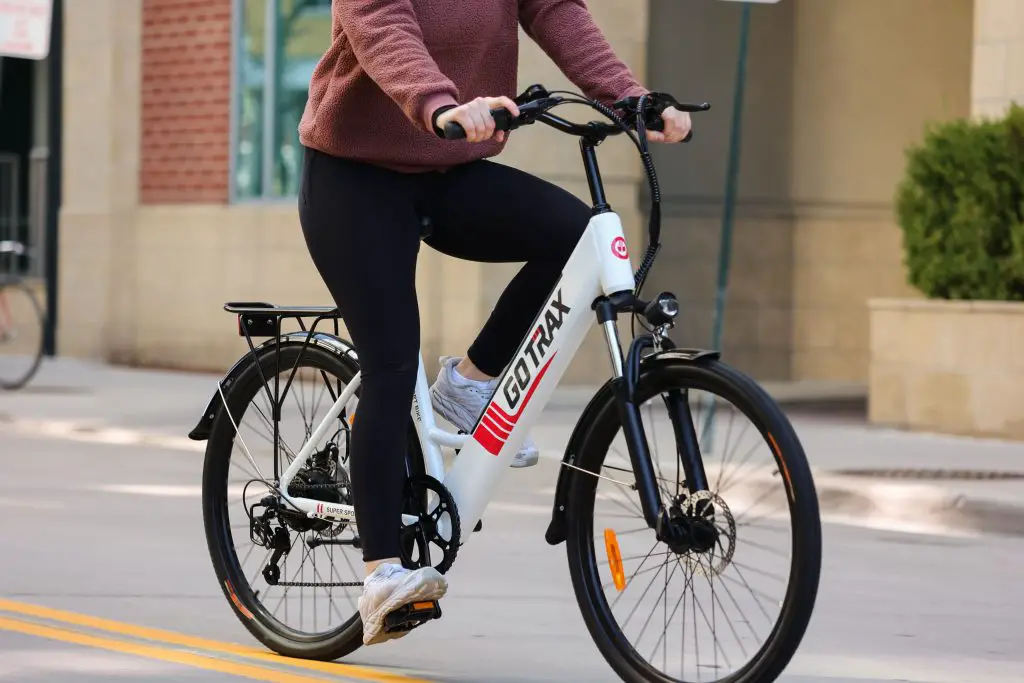This article will review some reasons to buy bike insurance for your e-bike. Due to their high cost and potential risks on the road, these bikes are frequently only partially covered by the homeowner, renter, or auto insurance. Maintaining an uninsured e-bike is risky for your e-bike. There is electric bike insurance, and it fills in the coverage gaps and fine print exclusions between auto, home, and renters insurance.

Contents
Is there a speed limit on E-Bikes in the United States?
Under motor power alone, the general speed limit for e-Bikes is 20 miles per hour or less. This speed limit is also stated in the tiered classification system that many states have adopted. According to that classification, the legal limit for Class 1 and 2 bikes is 20 miles per hour.
Class 3 bikes can only travel at a top speed of 28 mph. Federal law recognizes and permits eBikes to move more quickly when the rider applies motor and pedal power.

In some places, there may also be local speed limits. Riders should adhere to local speed limits when on public roads, even though some states have set a specific speed limit for electric bikes. Even though many bikes can travel up to 30 miles per hour, you should abide by any lower local limits if you’re in a place like a school zone.
Reasons to Buy Bike Insurance for Your E-Bike – Cost
In our earlier articles, we discussed the considerations you should make when purchasing e-bikes and the necessity of choosing second-hand models. If you already own an electric bicycle or are considering purchasing one, you know the required sizable investment. A high-end e-bike can cost up to $12,000, an entry-level e-bike of good quality can cost upwards of $1,000, and an e-bike of average value costs around $3,000. With an investment like that, you want to ensure you have enough coverage for theft or damage. Additionally, electric bikes frequently travel quickly and over long distances using complex mechanical, electrical, and computer-driven systems, so they are more prone to damage or loss.
What states of the US require a license to ride an E-Bike?

Licensing and registration are essential in the states where e-Bikes are regarded as mopeds or scooters. A license is needed to operate an e-Bike in Alabama, Alaska, West Virginia, Massachusetts, Missouri, New Mexico, Wisconsin, and North Dakota. Electric bikes are typically exempt from registration, licensing, or insurance requirements in states that use the three-tiered classification system. States that do not classify e-bikes as motor vehicles do not impose the same insurance regulations that apply to conventional motor vehicles.

Many states treat electric bikes similarly to mopeds when regulating their license and registration requirements. However, e-Bike insurance is only mandated in some of those states. Consider including your electric bike in your home and contents insurance to protect it from theft or damage, even though driver’s insurance is rarely necessary.
Reasons to Buy Bike Insurance for Your E-Bike – High Potential Risks
E-bikes have a greater need for liability coverage because, without insurance, an e-biker who caused an accident could be held personally liable and face devastating financial liabilities. Because they move more quickly and are heavier than bicycles, electric bikes have a high potential for causing property damage or personal injury to others. E-bikes are only partially covered by homeowners’, renter’s, and auto insurance.

Electric bikes, being considered motorized vehicles, traditional homeowners and renter insurance policies typically offer little to no coverage for theft, damage, or liability related to e-bikes. Additionally, because e-bikes do not need to be registered and riders do not need a valid driver’s license, auto insurance companies might not offer e-bike insurance.
What is the minimum age required to ride an e-Bike?
State-by-state differences in eBike age restrictions often only apply to Class 2 or 3 models. Riders must be 14 or older in eight states to ride unaccompanied at all classification levels. These states include Alabama, Alaska, Michigan, New Hampshire, North Carolina, Utah, and Virginia. Riders under this age may ride electric bikes in some states if they are under the supervision of an adult over 18.

The minimum age for e-Bike riders in six states is 15, and the minimum for riders in fifteen states is 16. If an adult is with the rider, these rules have some state-specific exceptions. Although many states do not have a set legal age limit for riding, most of those states do mandatory helmet use for riders under the age of 16 or 18.
READ MORE
How Much Money Should You Spend on an Electric Bike?
How to Carry a Water Bottle on Your Electric Bike Best Tips in 2023




